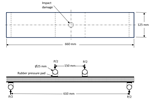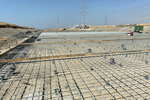Concrete paving standard addresses required materials for dowel bars
New standard approved by ASTM International seeks to strengthen highway infrastructure with the use of non-corroding GFRP dowel bars.
Source | Wikimedia Commons, licensed under the license
’s (West Conshohocken, Pa., U.S.) composite materials committee (D30) has approved a new standard that addresses material requirements for glass fiber-reinforced polymer (GFRP) dowel bars used as load transfer devices in concrete paving. describes the use of non-corroding GFRP dowel bars in civil infrastructure, specifically highway and street paving, as well as in the presence of inductance loops or sensors used in high-speed tolling zones.
“For many years, the use of non-corroding, non-metallic GFRP dowel bars have been studied as an alternative load transfer device,” says Doug Gremel, a committee member who worked on the new standard. “They have been proven through multiple trial projects and research to be a viable alternative that can make our highway infrastructure last longer.”
Because GFRP dowel bars are non-metallic, unlike steel or epoxy-coated steel dowel bars, they will not corrode from road and de-icing salts that permeate cracks in the concrete or concrete joints, making the civil infrastructure more durable and sustainable, according to Gremel.
The standard, which would be used by government agencies to qualify and specify potential suppliers for bidding on a project, includes a comprehensive set of qualification tests that provide evidence of suitability for use and a set of quality control tests that would be reported for any individual production lot. It also standardizes a set of physical and mechanical properties for use by a paving designer.
The new standard correlates to the United Nations Sustainable Development Goal 9: Industry, Innovation, and Infrastructure.
For related content, read “ASTM composite materials standard proposals to support new infrastructure.”
Related Content
-
Owens Corning to sell glass fiber business to Praana Group
Transaction with India-based holding group completes Owens Corning’s previously announced strategic review of the business, strengthens its focus on residential and commercial building products.
-
Polaris Spaceplanes receives MIRA II, MIRA III fiberglass airframes
German aerospace startup prepares next demonstrators toward reusable space launch and hypersonic transport toward routine, low-cost and safe access to space.
-
High-tension, vertical filament winding enables affordable flywheel energy storage system
French startup Energiestro’s prototype solar energy flywheel-based storage system aims to reduce costs with glass fiber composites and prestressed concrete.






